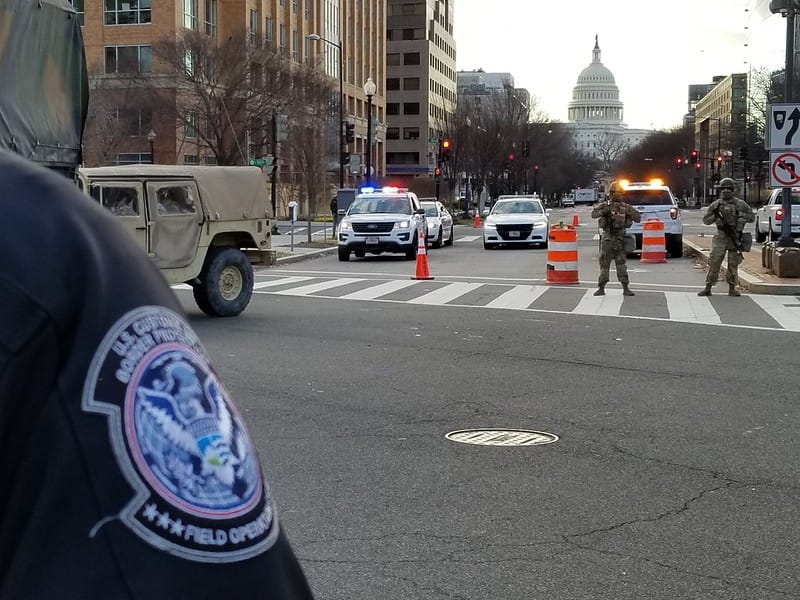Supreme Court Follies: Internal Checkpoint Edition
Marshall and Brennan were certain that the majority's ruling in the case would ultimately lead to Fourth Amendment rights violations at scale at these internal checkpoints. History has proven them right.

Bad Supreme Court decisions didn't start with the current Roberts court. Almost 50 years ago, the majority on the nation's highest judicial body ruled that "brief stops" of motorists by Border Patrol agents were no big deal, not a Fourth Amendment violation, and vital for immigration enforcement. The dissenters eviscerated those arguments, and time has proven their critiques were spot on.
Publisher's note: In light of the fact that illegal immigration and how to deal with it will once again be front and center in the current presidential campaign, I thought it would be a good idea to take a look back at how the Supreme Court's 1976 decision in US v. Martinez-Fuerte has created a de facto "Fourth Amendment Dead Zone" encompassing two-thirds of the American population and why overturning it is so important.
One of the ironies of a lot of Fourth Amendment case law is that in many instances the individuals involved were not perfectly innocent Americans wrongly victimized by police. In many cases, those challenging ostensibly illegal searches and seizures were not exactly model citizens, and in some cases not citizens at all. Such was the case with Amado Martinez-Fuerte, as the Court noted:
Respondent Amado Martinez-Fuerte approached the checkpoint driving a vehicle containing two female passengers. The women were illegal Mexican aliens who had entered the United States at the San Ysidro port of entry by using false papers and rendezvoused with Martinez-Fuerte in San Diego to be transported northward. [428 U.S. 543, 547]
Martinez-Fuerte was stopped at the San Clemente, California Border Patrol checkpoint, and agents quickly determined that he'd violated U.S. immigration law by attempting to illegally transport non-citizens into the country. In federal court, Martinez-Fuerte challenged his arrest and sought to suppress any evidence the government obtained on the grounds that the seizure and search of his vehicle violated the Fourth Amendment. He lost at the district and appellate levels, and two days after the 1976 July 4th holiday, he fared no better with the Supreme Court.
Indeed, a year before the Martinez-Fuerte case, the high court had ruled that while race-based roving Border Patrol stops were not constitutional, it did affirm the legitimacy of the Border Patrol's regulation allowing properly predicated immigration enforcement-related stops up to 100 miles into the U.S. interior--a decision that placed two-thirds of the U.S. population in the "border zone."
That Border Patrol regulation was never subjected to the public rulemaking process, which made the Court's decision in the roving patrol case all the more outrageous. It also guaranteed that in Martinez-Fuerte's case, the seizure and search he and his passengers were subjected to would be upheld as valid.
In fact, the majority seemed to treat the defendant's Fourth Amendment concerns as trivial.
The defendants arrested at the San Clemente checkpoint suggest that its operation involves a significant extra element of intrusiveness in that only a small percentage of cars are referred to the secondary inspection area, thereby "stigmatizing" those diverted and reducing the assurances provided by equal treatment of all motorists. We think defendants overstate the consequences. Referrals are made for the sole purpose of conducting a routine and limited inquiry into residence status that cannot feasibly be made of every motorist where the traffic is heavy. The objective intrusion of the stop and inquiry thus remains minimal. Selective referral may involve some annoyance, but it remains true that the stops should not be frightening or offensive because of their public and relatively routine nature. Moreover, selective referrals - rather than questioning the occupants of every car tend to advance some Fourth Amendment interests by minimizing the intrusion on the general motoring public. [428 U.S. 543, 560]
Justices Marshall and Brennan wrote a stinging dissent, noting at the outset that, "Today's decision is the ninth this Term marking the continuing evisceration of Fourth Amendment protections against unreasonable searches and seizures." [428 U.S. 543, 567] The duo further noted that, "There is no principle in the jurisprudence of fundamental rights which permits constitutional limitations to be dispensed with merely because they cannot be conveniently satisfied." [428 U.S. 543, 576]
Marshall and Brennan also made a point that the majority's ruling in the Martinez-Fuerte case was, at its base, racist.
Even if good faith is assumed, the affront to the dignity of American citizens of Mexican ancestry and Mexican aliens lawfully within the country is in no way diminished. The fact still remains that people of Mexican ancestry are targeted for examination at checkpoints and that the burden of checkpoint intrusions will lie heaviest on them. [428 U.S. 543, 574]
Marshall and Brennan were certain that the majority's ruling in the case would ultimately lead to Fourth Amendment rights violations at scale at these internal checkpoints. History has proven them right. What they might not have expected is how the Border Patrol has gone from using the checkpoints for not only race-based immigration enforcement but expanding their use to claim a role in and publicity for counternarcotics stops as part of America's "War on Drugs."
In June 2022, the Government Accountability Office issued its third report in less than a decade on the Border Patrol's internal checkpoints, every one of which has been damning to one degree or another. The results of the June 2022 GAO investigation were devastating.
In effect, Border Patrol agents were stopping and seizing "dime bags" of marijuana at internal checkpoints, and in 91% of those cases, those arrested were American citizens. (p. 25) Of particular note, CBP officials told GAO investigators that U.S. Attorney’s offices in their sector generally do not prosecute people for possessing personal use quantities of marijuana. (p. 27)
So, to sum it up: Border Patrol internal checkpoints are constitutional rights violations zones that are also utilized for a form of "War on Drugs" security theater, complete with punitive private property expropriations and more often than not arrests of Americans who will not, and should not, be prosecuted for having personal use quantities of "weed" in their possession.
If you're wondering just how many of these fixed checkpoints exist in the American southwest, a few years ago I used Google Earth and Google Street View, along with some other sources, to document their locations. For over six years, I've had a Freedom of Information Act (FOIA) lawsuit running against Customs and Border Protection (CBP, the parent element of the Border Patrol) trying to pry lose data on their operations. You can read about some of the more remarkable things I've uncovered here.
So, what's the solution to the insane 100-mile "border zone" and the constitutional rights violations stations it makes possible?
Congress should pass legislation that 1) restricts the "border zone" to no more than 1 mile from any international border, 2) prohibit the construction or use of internal checkpoints outside of that 1-mile zone, and 3) restore the Fourth Amendment's probable cause standard for any seizure and searches of vehicles and persons stopped at said checkpoints.
Thanks for reading the Sentinel. If you're not currently a subscriber, please consider becoming one as doing so is free through 2024 and it's an easy way to show your support for my work. Also, please share this piece with family, friends, and anyone else you believe would benefit from reading it.
P.S. -- If you're concerned about Trump's plans to conduct mass deportations, then check out my recent piece in The Bulwark on how he could potentially pull it off if he's elected again.





